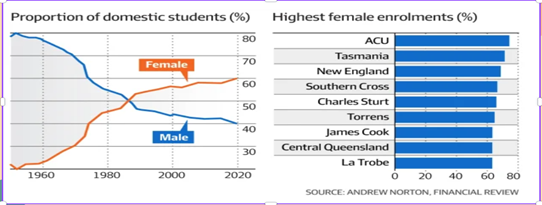Being a Mum and Student: Their World of Study and Careers
10/07/2024
Mary McGovern has been working in the university sector for over 15 years across industry liaison, internship preparation, teaching in enabling programs and lecturing in career development learning (CDL) and work integrated learning (WIL). Mary has held professional CDAA membership for nearly 5 years and is undertaking her PhD investigating student mothers’ career self-management during higher education.

Mothers choosing new directions
Students in our classrooms and clients in our career consultations continue to change. I meet more females than males and over the last five years I am meeting more parents, mostly mothers. As we all know, each individual needs to find their path forward but they often need guidance and support.
An American report found motherhood is equivalent to working 2.5 jobs which highlights how busy mothers are. To some extent, societal expectations are changing, providing more mothers with the opportunity to choose to parent, work, and/or study. That choice may be driven by change of relationships, the need for more stable employment, the appreciation of education, or because of a long term wish.

Image: pregnantthenscrewed.com
Student mothers in education
Student mothers are not easily identified at university and are subsumed within the ever-increasing female population. Interestingly, females are now the majority gender accessing and completing higher education in Australia. In the 1980’s, females took the lead in numbers of enrolments, and this has continued until the present day where we now see a 60:40 ratio.
One reason it is difficult to identify the number of student mothers is because universities do not collect data on caring responsibilities. Universities are more focused on age, gender, geographic location, socio-economic status, past education, and females in non-traditional areas – this is the data that must be reported to the government by universities.
However, we are seeing more student mothers in university advertising, so they are definitely ‘known about’. With universities starting to promote and welcome student mothers on ‘campus’ in person or online, they are identifying the need to support them. They are starting to offer provisions, including parenting facilities, campus childcare, and parking. But student mothers still need more access to career exploration, career guidance and work related experiences.
Where are they studying and why?
Julie Hare’s article from the Financial Review (2024) shared Norton’s findings which identified nine regional universities having the highest enrolments by females. The University of New South Wales (UNSW) and Royal Melbourne Institute of technology (RMIT) were the only two universities that had larger male populations. Isn’t it interesting that many of the regional universities are predominantly female; are they providing the right study courses, offering flexibility, supporting the development of new identities?

Charts Domestic students by gender over 60years and Universities with highest female enrolments
A report by Andrewartha (2022) identified the parenting population at 12.7% and noted the difficulty of determining this data. Andrewartha also explored how, “Higher education provided these mothers with an enhanced sense of confidence, freedom, achievement, and professional identity”. Additionally, the children of student mothers benefit by having a strong educational role model, which is being researched and proving highly effective.
Think about how many future career conversations could change if they had a parent who has experienced higher education and engaged in career self-management. However, it can be difficult for students mothers to be successful in study - finding time to attend classes, submit assessments and complete placement - all while managing a plethora of family commitments and often facing financial struggles.
Career choices of student mothers
Who are these student mothers?
They are individuals:
- Starting higher education for the first time with babies, toddlers, primary school age, high school age or post-high school age children
- Choosing a new career because of parenting
- Needing to change careers as past roles are no longer suitable
- Wanting to learn, following a long-time dream, making a change for their future
But there is currently a lack of knowledge around the career choices of student mothers. The following chart from ABS Education and Work Australia highlights that females are the largest percentage primarily in society and culture, health, and education fields of study.

Graph showing Field of current study for a non-school qualification by sex
Source: ABS, Education and Work May 2023, Australia
Is this the same for student mothers? Do career aspirations change after parenting? Does parenting provide a new lens of their skills and interests? Study choices and careers need to be more connected and transparent particularly as we have increases in access, and we want to support student mothers if they choose to join or rejoin the workforce.
Career choices direct career development paths so we need to ascertain and understand career journeys of student mothers at entry, during and exit of higher education. A UK Report by the Institute of Employment Research (2015) on tracking student mothers revealed that student mothers initially had clear career plans on entry but these often changed during study. Accessing career services was relatively low with reasons being due to lack of time, and feeling they knew what they wanted to do.
What can mothers do to manage their careers?
- Realising the importance of career exploration – student mothers need to increase their self-awareness, and identify opportunities that match their current or developing skills, interests and values. They need to develop an understanding of future opportunities
- Having self-efficacy and outcome expectations – student mothers need to have self-belief that they can achieve and move toward their career ambitions and be aware of the potential outcomes
- Setting career goals – student mothers need to clearly define goals that match their life stage and should be congruent with their skills and values
- Seeking support when required – student mothers need to seek support at different stages of study from the beginning and regularly through to the end of study, not just as they plan to graduate
- Developing career adaptability– student mothers need to understand how to be adaptable – being curious, having concern, and feeling in control and confident so they can transition effectively
What can career practitioners and education providers do to support student mothers?
- Encourage, promote and provide access and support for career development - career services must be visible and relevant to student mothers on entry, during and exit of university
- Develop their confidence, support the development of their professional identity and guide their decision-making and help them realise they are in control and empowered - provide opportunity for reflection, experience and practice
- Provide opportunities that are suitable and accessible by student mothers – are opportunities equitable for students, online/in-person, can opportunities be varied to suit personal circumstances
- Target and tailor support for student mothers – acknowledge this cohort, and welcome them to use services available within the university or elsewhere
- Share and celebrate student mother experiences – student mothers need to see themselves having success